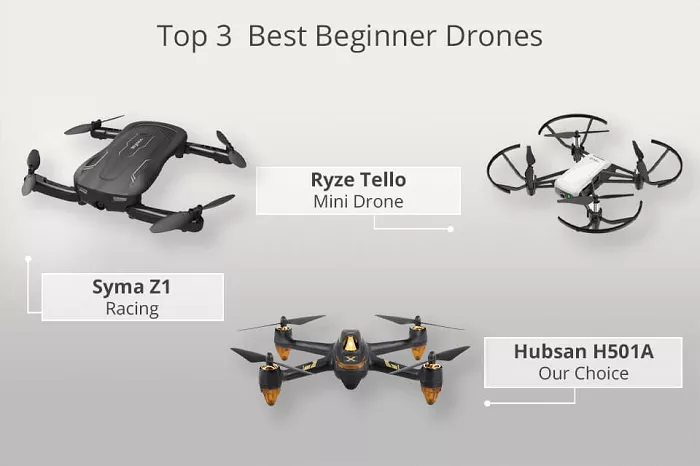Drones have revolutionized the way we capture images, explore landscapes, and experience flight. For beginners, selecting the right drone is crucial to ensure a smooth and enjoyable entry into this exciting hobby. This comprehensive guide will delve into the top starter drones of 2025, providing detailed specifications and insights to help you make an informed decision.
What to Look for in a Beginner Drone
When choosing your first drone, consider the following factors:
- Ease of Use: Look for drones with intuitive controls, auto takeoff/landing, and beginner-friendly modes.
- Stability and Safety: Features like GPS stabilization, altitude hold, and obstacle avoidance enhance flight stability and safety.
- Camera Quality: A decent camera allows you to capture high-quality photos and videos, enriching your flying experience.
- Flight Time and Range: Longer battery life and extended control range provide more freedom to explore.
- Portability: Lightweight and foldable designs make it easier to transport your drone.
- Budget: Start with an affordable model to learn the basics before investing in higher-end drones.
Top Starter Drones in 2025
1. DJI Neo
The DJI Neo is a compact and lightweight drone, weighing just 135 grams, making it ideal for beginners and indoor flights. Despite its small size, it boasts impressive features:
- Camera: 12 MP photos and 4K video at 30 fps.
- AI-Powered Flight Modes: Includes intelligent tracking and hands-free operation.
- Flight Time: Up to 18 minutes.
- Control Range: Video transmission up to 10 km.
- Additional Features: Voice command capability, return-to-home function, and integrated propeller guards for safety.
The DJI Neo’s user-friendly design and advanced features make it a top choice for novice pilots.
2. Autel Robotics EVO Nano+
The Autel EVO Nano+ is a feature-rich drone that balances performance and portability:
- Camera: 50 MP 1/1.28″ CMOS sensor with an f/1.9 lens, capable of 4K video at 30 fps.
- Flight Time: Up to 28 minutes.
- Weight: 249 grams, exempting it from certain registration requirements.
- Obstacle Avoidance: Equipped with forward, backward, and downward sensors.
- Control Range: Up to 10 km with the included transmitter.
- Additional Features: 3-axis gimbal stabilization, multiple photo modes, and compatibility with the Autel Sky app.
The EVO Nano+ offers advanced imaging capabilities and safety features, making it suitable for beginners aiming for high-quality aerial photography.
3. Potensic Atom SE
The Potensic Atom SE is an affordable and portable option for beginners:
- Camera: 12 MP Sony CMOS sensor with 4K video at 30 fps, featuring electronic image stabilization.
- Flight Time: Up to 31 minutes.
- Weight: Less than 249 grams, enhancing portability and reducing regulatory requirements.
- Control Range: Up to 4 km with the PixSync 2.0 transmission system.
- Additional Features: Foldable design, GPS-assisted flight, and multiple flight modes.
The Atom SE’s combination of affordability, ease of use, and decent camera quality makes it a great entry-level drone.
4. Ryze Tello
Developed in collaboration with DJI, the Ryze Tello is a budget-friendly drone perfect for beginners and educational purposes:
- Camera: 5 MP photos and 720p video recording.
- Flight Time: Approximately 13 minutes.
- Weight: 80 grams, making it extremely lightweight and safe for indoor use.
- Control: Operated via smartphone app with intuitive controls.
- Additional Features: Electronic image stabilization, programmable via Scratch, and various flight modes.
The Ryze Tello’s simplicity and educational features make it an excellent choice for young pilots and those new to drones.
Tips for First-Time Drone Pilots
- Start in Open Spaces: Practice flying in wide, open areas away from obstacles.
- Read the Manual: Familiarize yourself with your drone’s features and controls.
- Check Local Regulations: Ensure compliance with local laws regarding drone usage.
- Practice Basic Maneuvers: Learn to hover, take off, land, and navigate before attempting complex flights.
- Monitor Battery Levels: Always keep an eye on your drone’s battery to prevent unexpected landings.
Conclusion
Choosing the right starter drone depends on your specific needs, budget, and interests. Whether you’re looking for affordability, advanced features, or portability, there’s a beginner-friendly drone out there for you. Start with a model that aligns with your goals, practice regularly, and soon you’ll be ready to explore more advanced drones and flight techniques.


